QAB020C406S Business Psychology: Reflective Development Report
VerifiedAdded on 2023/01/13
|13
|4112
|33
Report
AI Summary
This report, submitted as part of a Business Psychology module (QAB020C406S), presents a reflective personal development plan. It begins with an introduction to psychological approaches for understanding self and others in the workplace, followed by three reflective journal entries using a pro-forma, focusing on core skills like team working, written communication, and conflict resolution. Each journal entry assesses the student's current competence, identifies contradictions in self-perception, and explores how the skill will be beneficial in the future. The report concludes with a summary action plan, highlighting strengths and weaknesses derived from the journal entries and outlining a personal development plan for improvement.
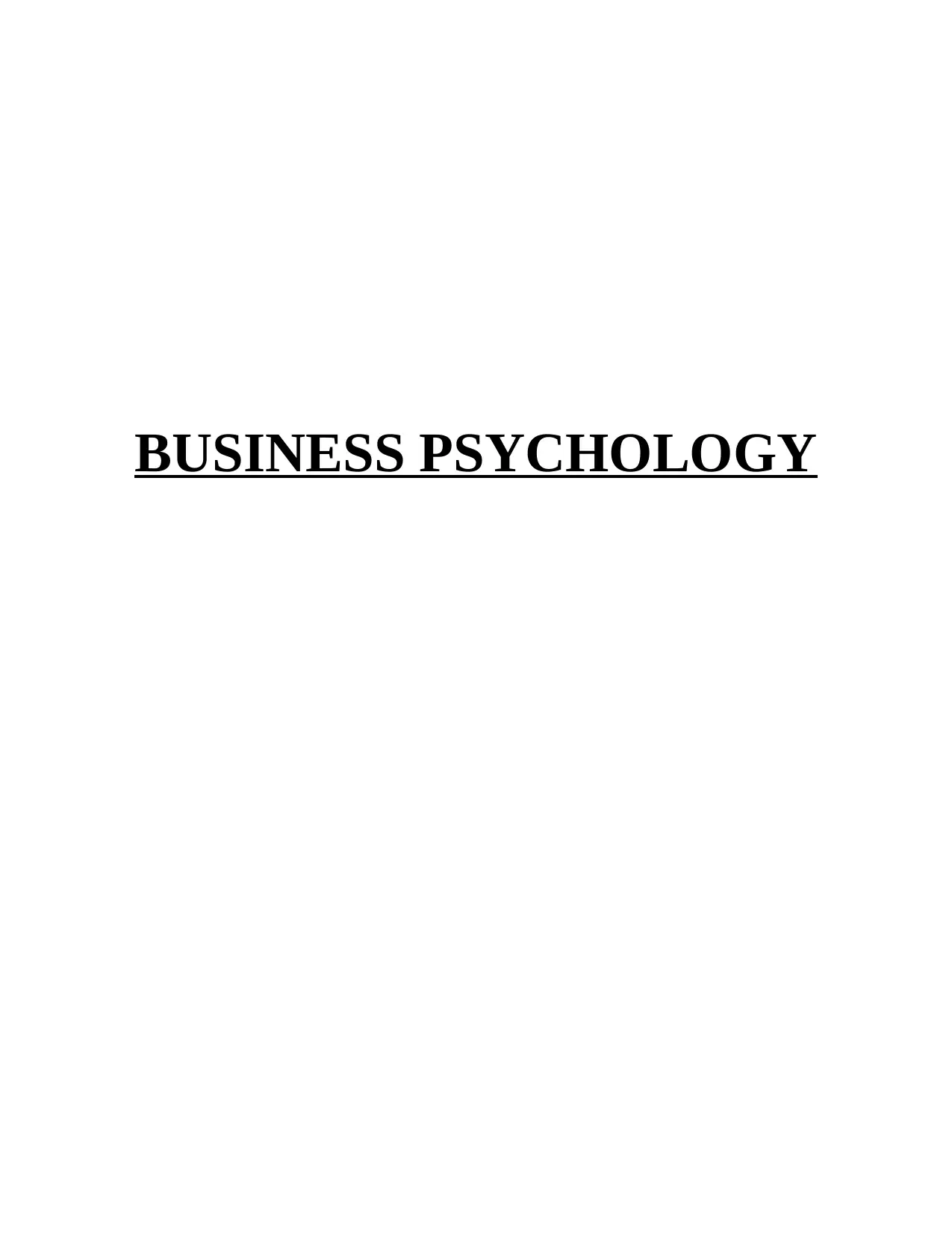
BUSINESS PSYCHOLOGY
Paraphrase This Document
Need a fresh take? Get an instant paraphrase of this document with our AI Paraphraser
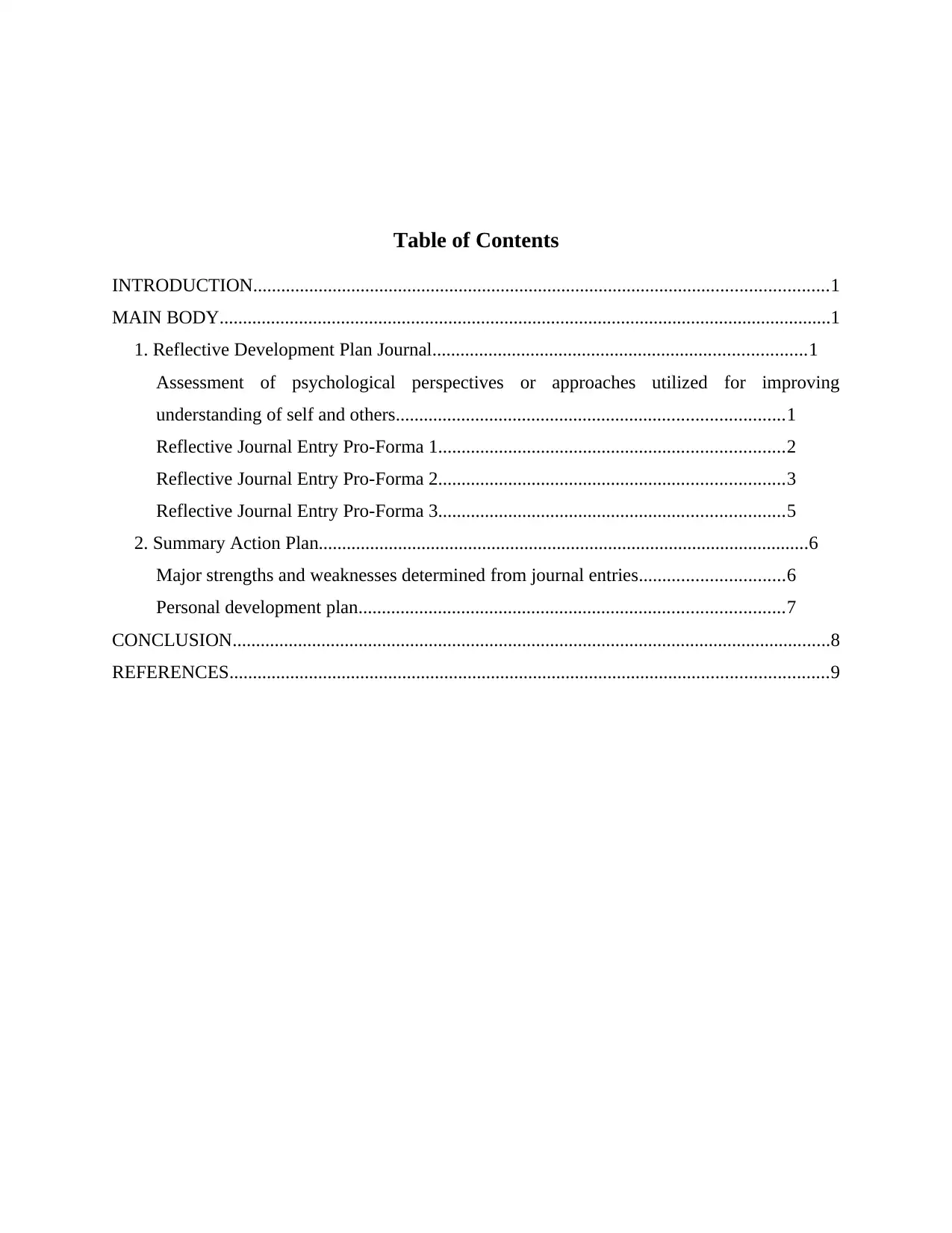
Table of Contents
INTRODUCTION...........................................................................................................................1
MAIN BODY...................................................................................................................................1
1. Reflective Development Plan Journal................................................................................1
Assessment of psychological perspectives or approaches utilized for improving
understanding of self and others...................................................................................1
Reflective Journal Entry Pro-Forma 1..........................................................................2
Reflective Journal Entry Pro-Forma 2..........................................................................3
Reflective Journal Entry Pro-Forma 3..........................................................................5
2. Summary Action Plan.........................................................................................................6
Major strengths and weaknesses determined from journal entries...............................6
Personal development plan...........................................................................................7
CONCLUSION................................................................................................................................8
REFERENCES................................................................................................................................9
INTRODUCTION...........................................................................................................................1
MAIN BODY...................................................................................................................................1
1. Reflective Development Plan Journal................................................................................1
Assessment of psychological perspectives or approaches utilized for improving
understanding of self and others...................................................................................1
Reflective Journal Entry Pro-Forma 1..........................................................................2
Reflective Journal Entry Pro-Forma 2..........................................................................3
Reflective Journal Entry Pro-Forma 3..........................................................................5
2. Summary Action Plan.........................................................................................................6
Major strengths and weaknesses determined from journal entries...............................6
Personal development plan...........................................................................................7
CONCLUSION................................................................................................................................8
REFERENCES................................................................................................................................9

You're viewing a preview
Unlock full access by subscribing today!
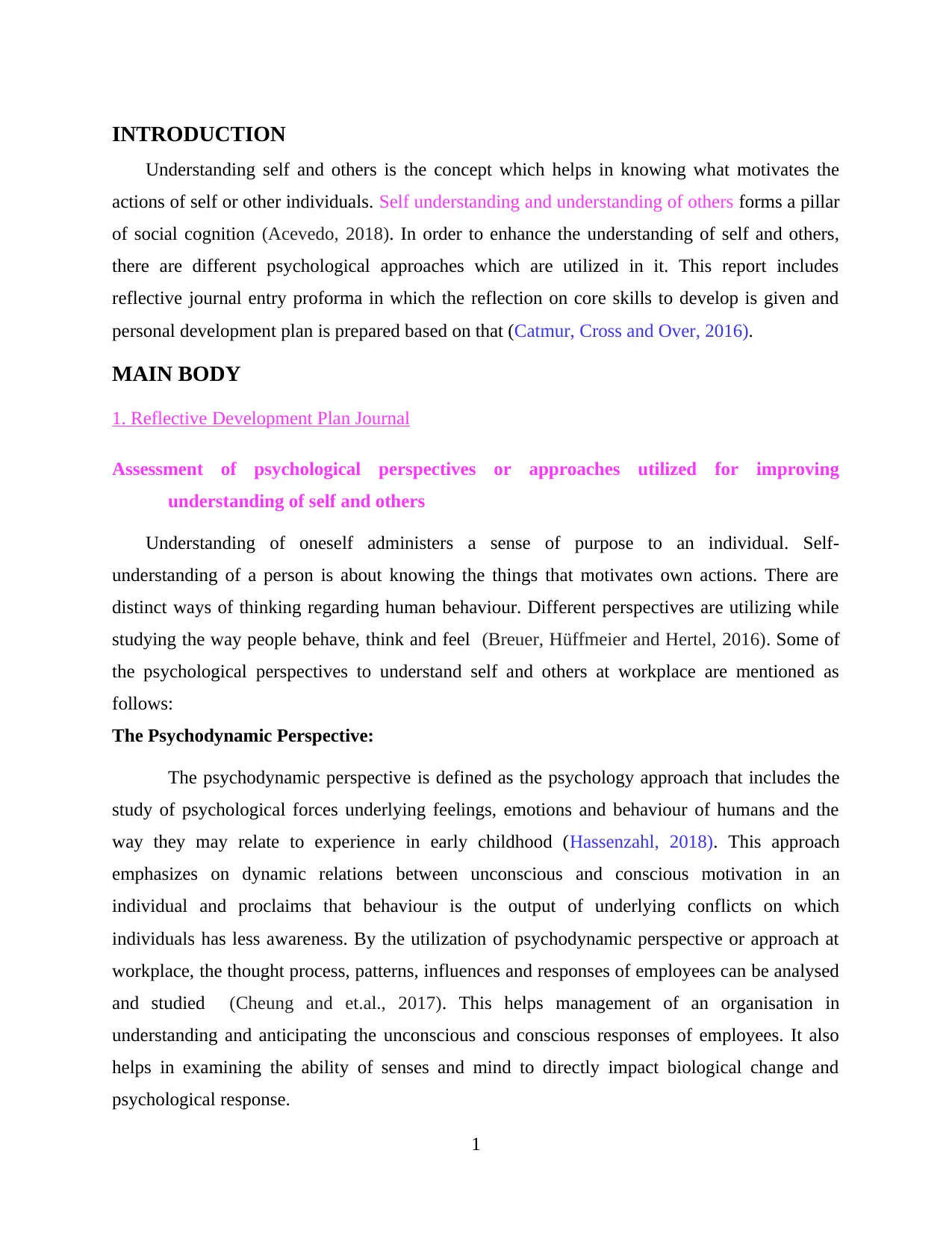
INTRODUCTION
Understanding self and others is the concept which helps in knowing what motivates the
actions of self or other individuals. Self understanding and understanding of others forms a pillar
of social cognition (Acevedo, 2018). In order to enhance the understanding of self and others,
there are different psychological approaches which are utilized in it. This report includes
reflective journal entry proforma in which the reflection on core skills to develop is given and
personal development plan is prepared based on that (Catmur, Cross and Over, 2016).
MAIN BODY
1. Reflective Development Plan Journal
Assessment of psychological perspectives or approaches utilized for improving
understanding of self and others
Understanding of oneself administers a sense of purpose to an individual. Self-
understanding of a person is about knowing the things that motivates own actions. There are
distinct ways of thinking regarding human behaviour. Different perspectives are utilizing while
studying the way people behave, think and feel (Breuer, Hüffmeier and Hertel, 2016). Some of
the psychological perspectives to understand self and others at workplace are mentioned as
follows:
The Psychodynamic Perspective:
The psychodynamic perspective is defined as the psychology approach that includes the
study of psychological forces underlying feelings, emotions and behaviour of humans and the
way they may relate to experience in early childhood (Hassenzahl, 2018). This approach
emphasizes on dynamic relations between unconscious and conscious motivation in an
individual and proclaims that behaviour is the output of underlying conflicts on which
individuals has less awareness. By the utilization of psychodynamic perspective or approach at
workplace, the thought process, patterns, influences and responses of employees can be analysed
and studied (Cheung and et.al., 2017). This helps management of an organisation in
understanding and anticipating the unconscious and conscious responses of employees. It also
helps in examining the ability of senses and mind to directly impact biological change and
psychological response.
1
Understanding self and others is the concept which helps in knowing what motivates the
actions of self or other individuals. Self understanding and understanding of others forms a pillar
of social cognition (Acevedo, 2018). In order to enhance the understanding of self and others,
there are different psychological approaches which are utilized in it. This report includes
reflective journal entry proforma in which the reflection on core skills to develop is given and
personal development plan is prepared based on that (Catmur, Cross and Over, 2016).
MAIN BODY
1. Reflective Development Plan Journal
Assessment of psychological perspectives or approaches utilized for improving
understanding of self and others
Understanding of oneself administers a sense of purpose to an individual. Self-
understanding of a person is about knowing the things that motivates own actions. There are
distinct ways of thinking regarding human behaviour. Different perspectives are utilizing while
studying the way people behave, think and feel (Breuer, Hüffmeier and Hertel, 2016). Some of
the psychological perspectives to understand self and others at workplace are mentioned as
follows:
The Psychodynamic Perspective:
The psychodynamic perspective is defined as the psychology approach that includes the
study of psychological forces underlying feelings, emotions and behaviour of humans and the
way they may relate to experience in early childhood (Hassenzahl, 2018). This approach
emphasizes on dynamic relations between unconscious and conscious motivation in an
individual and proclaims that behaviour is the output of underlying conflicts on which
individuals has less awareness. By the utilization of psychodynamic perspective or approach at
workplace, the thought process, patterns, influences and responses of employees can be analysed
and studied (Cheung and et.al., 2017). This helps management of an organisation in
understanding and anticipating the unconscious and conscious responses of employees. It also
helps in examining the ability of senses and mind to directly impact biological change and
psychological response.
1
Paraphrase This Document
Need a fresh take? Get an instant paraphrase of this document with our AI Paraphraser
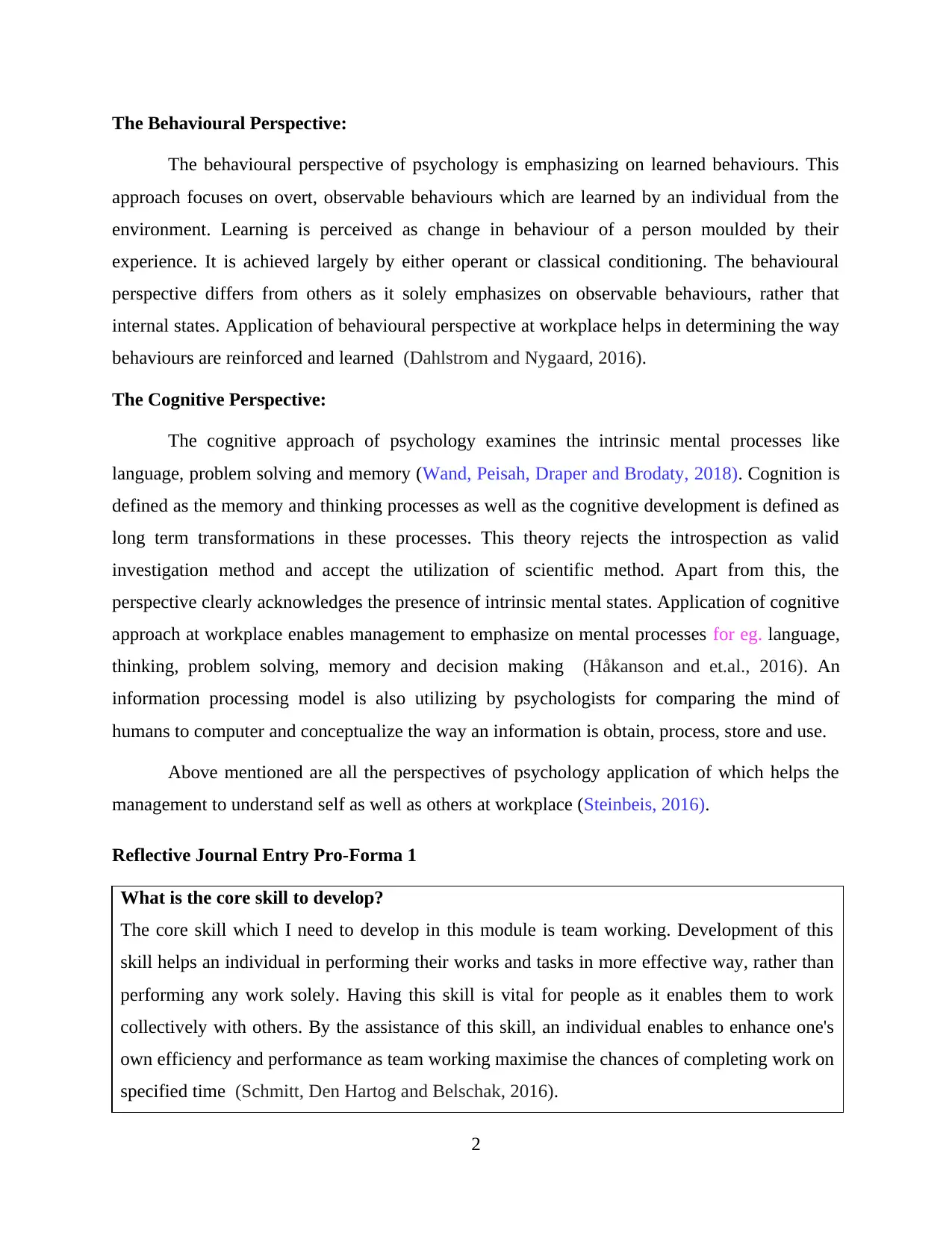
The Behavioural Perspective:
The behavioural perspective of psychology is emphasizing on learned behaviours. This
approach focuses on overt, observable behaviours which are learned by an individual from the
environment. Learning is perceived as change in behaviour of a person moulded by their
experience. It is achieved largely by either operant or classical conditioning. The behavioural
perspective differs from others as it solely emphasizes on observable behaviours, rather that
internal states. Application of behavioural perspective at workplace helps in determining the way
behaviours are reinforced and learned (Dahlstrom and Nygaard, 2016).
The Cognitive Perspective:
The cognitive approach of psychology examines the intrinsic mental processes like
language, problem solving and memory (Wand, Peisah, Draper and Brodaty, 2018). Cognition is
defined as the memory and thinking processes as well as the cognitive development is defined as
long term transformations in these processes. This theory rejects the introspection as valid
investigation method and accept the utilization of scientific method. Apart from this, the
perspective clearly acknowledges the presence of intrinsic mental states. Application of cognitive
approach at workplace enables management to emphasize on mental processes for eg. language,
thinking, problem solving, memory and decision making (Håkanson and et.al., 2016). An
information processing model is also utilizing by psychologists for comparing the mind of
humans to computer and conceptualize the way an information is obtain, process, store and use.
Above mentioned are all the perspectives of psychology application of which helps the
management to understand self as well as others at workplace (Steinbeis, 2016).
Reflective Journal Entry Pro-Forma 1
What is the core skill to develop?
The core skill which I need to develop in this module is team working. Development of this
skill helps an individual in performing their works and tasks in more effective way, rather than
performing any work solely. Having this skill is vital for people as it enables them to work
collectively with others. By the assistance of this skill, an individual enables to enhance one's
own efficiency and performance as team working maximise the chances of completing work on
specified time (Schmitt, Den Hartog and Belschak, 2016).
2
The behavioural perspective of psychology is emphasizing on learned behaviours. This
approach focuses on overt, observable behaviours which are learned by an individual from the
environment. Learning is perceived as change in behaviour of a person moulded by their
experience. It is achieved largely by either operant or classical conditioning. The behavioural
perspective differs from others as it solely emphasizes on observable behaviours, rather that
internal states. Application of behavioural perspective at workplace helps in determining the way
behaviours are reinforced and learned (Dahlstrom and Nygaard, 2016).
The Cognitive Perspective:
The cognitive approach of psychology examines the intrinsic mental processes like
language, problem solving and memory (Wand, Peisah, Draper and Brodaty, 2018). Cognition is
defined as the memory and thinking processes as well as the cognitive development is defined as
long term transformations in these processes. This theory rejects the introspection as valid
investigation method and accept the utilization of scientific method. Apart from this, the
perspective clearly acknowledges the presence of intrinsic mental states. Application of cognitive
approach at workplace enables management to emphasize on mental processes for eg. language,
thinking, problem solving, memory and decision making (Håkanson and et.al., 2016). An
information processing model is also utilizing by psychologists for comparing the mind of
humans to computer and conceptualize the way an information is obtain, process, store and use.
Above mentioned are all the perspectives of psychology application of which helps the
management to understand self as well as others at workplace (Steinbeis, 2016).
Reflective Journal Entry Pro-Forma 1
What is the core skill to develop?
The core skill which I need to develop in this module is team working. Development of this
skill helps an individual in performing their works and tasks in more effective way, rather than
performing any work solely. Having this skill is vital for people as it enables them to work
collectively with others. By the assistance of this skill, an individual enables to enhance one's
own efficiency and performance as team working maximise the chances of completing work on
specified time (Schmitt, Den Hartog and Belschak, 2016).
2
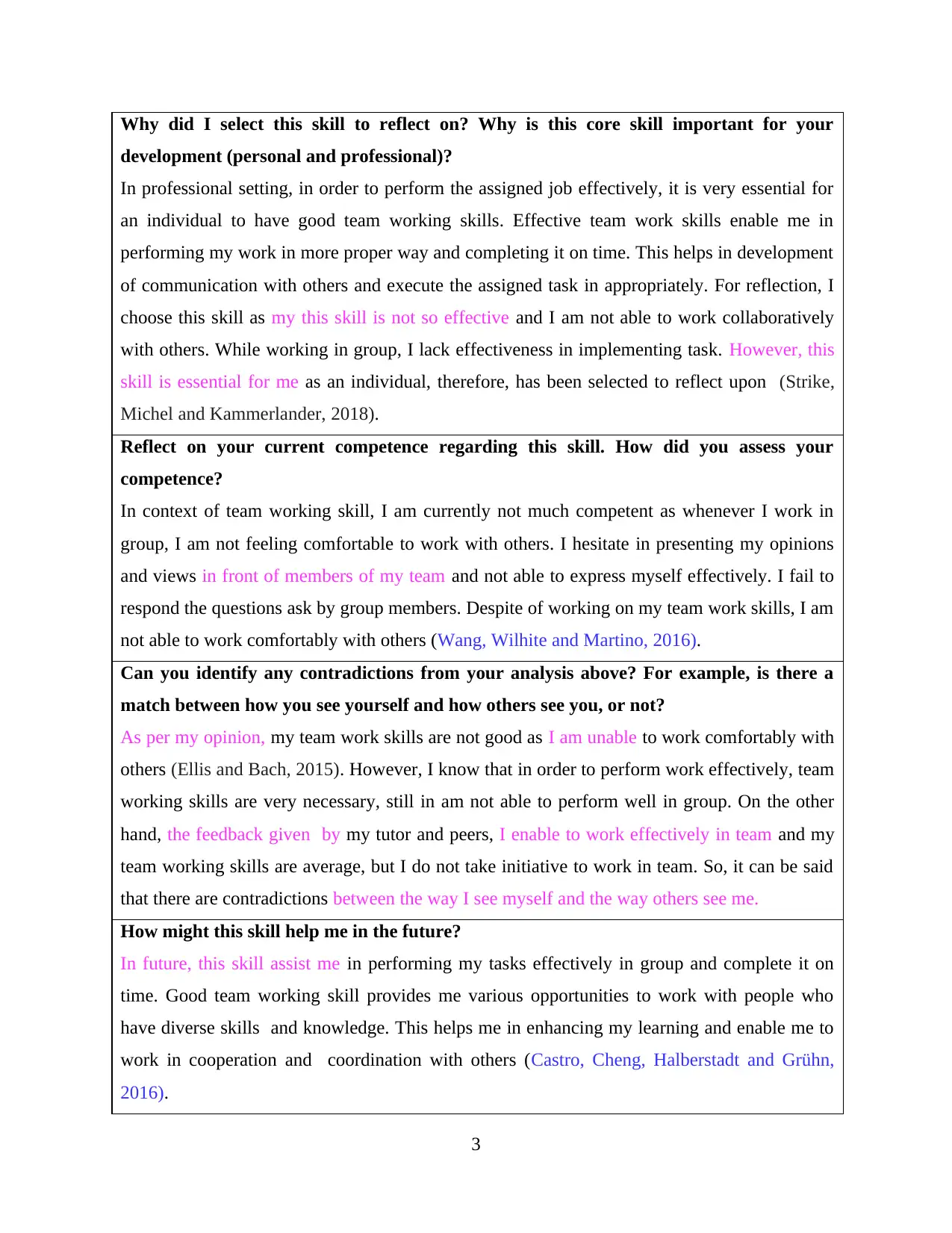
Why did I select this skill to reflect on? Why is this core skill important for your
development (personal and professional)?
In professional setting, in order to perform the assigned job effectively, it is very essential for
an individual to have good team working skills. Effective team work skills enable me in
performing my work in more proper way and completing it on time. This helps in development
of communication with others and execute the assigned task in appropriately. For reflection, I
choose this skill as my this skill is not so effective and I am not able to work collaboratively
with others. While working in group, I lack effectiveness in implementing task. However, this
skill is essential for me as an individual, therefore, has been selected to reflect upon (Strike,
Michel and Kammerlander, 2018).
Reflect on your current competence regarding this skill. How did you assess your
competence?
In context of team working skill, I am currently not much competent as whenever I work in
group, I am not feeling comfortable to work with others. I hesitate in presenting my opinions
and views in front of members of my team and not able to express myself effectively. I fail to
respond the questions ask by group members. Despite of working on my team work skills, I am
not able to work comfortably with others (Wang, Wilhite and Martino, 2016).
Can you identify any contradictions from your analysis above? For example, is there a
match between how you see yourself and how others see you, or not?
As per my opinion, my team work skills are not good as I am unable to work comfortably with
others (Ellis and Bach, 2015). However, I know that in order to perform work effectively, team
working skills are very necessary, still in am not able to perform well in group. On the other
hand, the feedback given by my tutor and peers, I enable to work effectively in team and my
team working skills are average, but I do not take initiative to work in team. So, it can be said
that there are contradictions between the way I see myself and the way others see me.
How might this skill help me in the future?
In future, this skill assist me in performing my tasks effectively in group and complete it on
time. Good team working skill provides me various opportunities to work with people who
have diverse skills and knowledge. This helps me in enhancing my learning and enable me to
work in cooperation and coordination with others (Castro, Cheng, Halberstadt and Grühn,
2016).
3
development (personal and professional)?
In professional setting, in order to perform the assigned job effectively, it is very essential for
an individual to have good team working skills. Effective team work skills enable me in
performing my work in more proper way and completing it on time. This helps in development
of communication with others and execute the assigned task in appropriately. For reflection, I
choose this skill as my this skill is not so effective and I am not able to work collaboratively
with others. While working in group, I lack effectiveness in implementing task. However, this
skill is essential for me as an individual, therefore, has been selected to reflect upon (Strike,
Michel and Kammerlander, 2018).
Reflect on your current competence regarding this skill. How did you assess your
competence?
In context of team working skill, I am currently not much competent as whenever I work in
group, I am not feeling comfortable to work with others. I hesitate in presenting my opinions
and views in front of members of my team and not able to express myself effectively. I fail to
respond the questions ask by group members. Despite of working on my team work skills, I am
not able to work comfortably with others (Wang, Wilhite and Martino, 2016).
Can you identify any contradictions from your analysis above? For example, is there a
match between how you see yourself and how others see you, or not?
As per my opinion, my team work skills are not good as I am unable to work comfortably with
others (Ellis and Bach, 2015). However, I know that in order to perform work effectively, team
working skills are very necessary, still in am not able to perform well in group. On the other
hand, the feedback given by my tutor and peers, I enable to work effectively in team and my
team working skills are average, but I do not take initiative to work in team. So, it can be said
that there are contradictions between the way I see myself and the way others see me.
How might this skill help me in the future?
In future, this skill assist me in performing my tasks effectively in group and complete it on
time. Good team working skill provides me various opportunities to work with people who
have diverse skills and knowledge. This helps me in enhancing my learning and enable me to
work in cooperation and coordination with others (Castro, Cheng, Halberstadt and Grühn,
2016).
3
You're viewing a preview
Unlock full access by subscribing today!
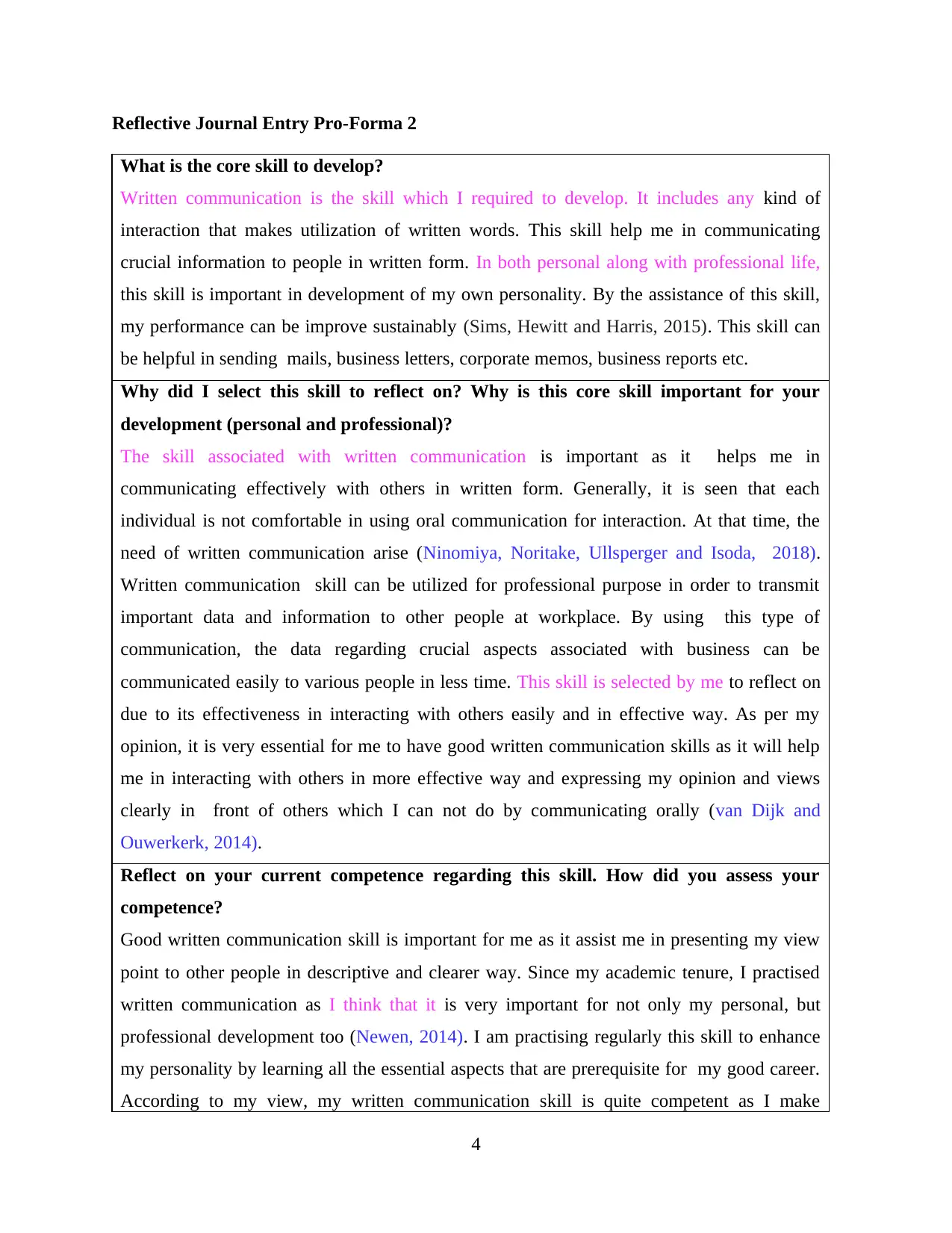
Reflective Journal Entry Pro-Forma 2
What is the core skill to develop?
Written communication is the skill which I required to develop. It includes any kind of
interaction that makes utilization of written words. This skill help me in communicating
crucial information to people in written form. In both personal along with professional life,
this skill is important in development of my own personality. By the assistance of this skill,
my performance can be improve sustainably (Sims, Hewitt and Harris, 2015). This skill can
be helpful in sending mails, business letters, corporate memos, business reports etc.
Why did I select this skill to reflect on? Why is this core skill important for your
development (personal and professional)?
The skill associated with written communication is important as it helps me in
communicating effectively with others in written form. Generally, it is seen that each
individual is not comfortable in using oral communication for interaction. At that time, the
need of written communication arise (Ninomiya, Noritake, Ullsperger and Isoda, 2018).
Written communication skill can be utilized for professional purpose in order to transmit
important data and information to other people at workplace. By using this type of
communication, the data regarding crucial aspects associated with business can be
communicated easily to various people in less time. This skill is selected by me to reflect on
due to its effectiveness in interacting with others easily and in effective way. As per my
opinion, it is very essential for me to have good written communication skills as it will help
me in interacting with others in more effective way and expressing my opinion and views
clearly in front of others which I can not do by communicating orally (van Dijk and
Ouwerkerk, 2014).
Reflect on your current competence regarding this skill. How did you assess your
competence?
Good written communication skill is important for me as it assist me in presenting my view
point to other people in descriptive and clearer way. Since my academic tenure, I practised
written communication as I think that it is very important for not only my personal, but
professional development too (Newen, 2014). I am practising regularly this skill to enhance
my personality by learning all the essential aspects that are prerequisite for my good career.
According to my view, my written communication skill is quite competent as I make
4
What is the core skill to develop?
Written communication is the skill which I required to develop. It includes any kind of
interaction that makes utilization of written words. This skill help me in communicating
crucial information to people in written form. In both personal along with professional life,
this skill is important in development of my own personality. By the assistance of this skill,
my performance can be improve sustainably (Sims, Hewitt and Harris, 2015). This skill can
be helpful in sending mails, business letters, corporate memos, business reports etc.
Why did I select this skill to reflect on? Why is this core skill important for your
development (personal and professional)?
The skill associated with written communication is important as it helps me in
communicating effectively with others in written form. Generally, it is seen that each
individual is not comfortable in using oral communication for interaction. At that time, the
need of written communication arise (Ninomiya, Noritake, Ullsperger and Isoda, 2018).
Written communication skill can be utilized for professional purpose in order to transmit
important data and information to other people at workplace. By using this type of
communication, the data regarding crucial aspects associated with business can be
communicated easily to various people in less time. This skill is selected by me to reflect on
due to its effectiveness in interacting with others easily and in effective way. As per my
opinion, it is very essential for me to have good written communication skills as it will help
me in interacting with others in more effective way and expressing my opinion and views
clearly in front of others which I can not do by communicating orally (van Dijk and
Ouwerkerk, 2014).
Reflect on your current competence regarding this skill. How did you assess your
competence?
Good written communication skill is important for me as it assist me in presenting my view
point to other people in descriptive and clearer way. Since my academic tenure, I practised
written communication as I think that it is very important for not only my personal, but
professional development too (Newen, 2014). I am practising regularly this skill to enhance
my personality by learning all the essential aspects that are prerequisite for my good career.
According to my view, my written communication skill is quite competent as I make
4
Paraphrase This Document
Need a fresh take? Get an instant paraphrase of this document with our AI Paraphraser
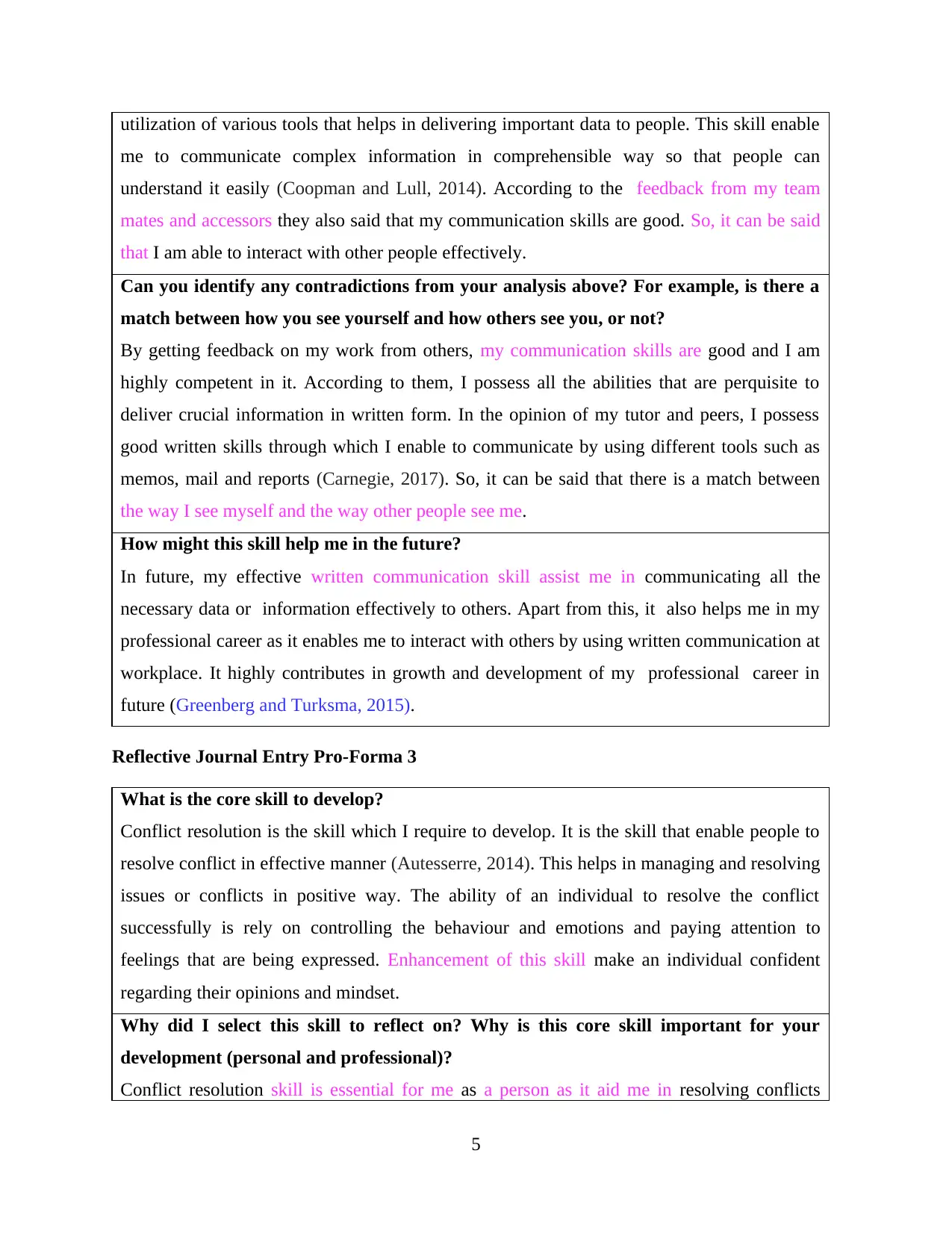
utilization of various tools that helps in delivering important data to people. This skill enable
me to communicate complex information in comprehensible way so that people can
understand it easily (Coopman and Lull, 2014). According to the feedback from my team
mates and accessors they also said that my communication skills are good. So, it can be said
that I am able to interact with other people effectively.
Can you identify any contradictions from your analysis above? For example, is there a
match between how you see yourself and how others see you, or not?
By getting feedback on my work from others, my communication skills are good and I am
highly competent in it. According to them, I possess all the abilities that are perquisite to
deliver crucial information in written form. In the opinion of my tutor and peers, I possess
good written skills through which I enable to communicate by using different tools such as
memos, mail and reports (Carnegie, 2017). So, it can be said that there is a match between
the way I see myself and the way other people see me.
How might this skill help me in the future?
In future, my effective written communication skill assist me in communicating all the
necessary data or information effectively to others. Apart from this, it also helps me in my
professional career as it enables me to interact with others by using written communication at
workplace. It highly contributes in growth and development of my professional career in
future (Greenberg and Turksma, 2015).
Reflective Journal Entry Pro-Forma 3
What is the core skill to develop?
Conflict resolution is the skill which I require to develop. It is the skill that enable people to
resolve conflict in effective manner (Autesserre, 2014). This helps in managing and resolving
issues or conflicts in positive way. The ability of an individual to resolve the conflict
successfully is rely on controlling the behaviour and emotions and paying attention to
feelings that are being expressed. Enhancement of this skill make an individual confident
regarding their opinions and mindset.
Why did I select this skill to reflect on? Why is this core skill important for your
development (personal and professional)?
Conflict resolution skill is essential for me as a person as it aid me in resolving conflicts
5
me to communicate complex information in comprehensible way so that people can
understand it easily (Coopman and Lull, 2014). According to the feedback from my team
mates and accessors they also said that my communication skills are good. So, it can be said
that I am able to interact with other people effectively.
Can you identify any contradictions from your analysis above? For example, is there a
match between how you see yourself and how others see you, or not?
By getting feedback on my work from others, my communication skills are good and I am
highly competent in it. According to them, I possess all the abilities that are perquisite to
deliver crucial information in written form. In the opinion of my tutor and peers, I possess
good written skills through which I enable to communicate by using different tools such as
memos, mail and reports (Carnegie, 2017). So, it can be said that there is a match between
the way I see myself and the way other people see me.
How might this skill help me in the future?
In future, my effective written communication skill assist me in communicating all the
necessary data or information effectively to others. Apart from this, it also helps me in my
professional career as it enables me to interact with others by using written communication at
workplace. It highly contributes in growth and development of my professional career in
future (Greenberg and Turksma, 2015).
Reflective Journal Entry Pro-Forma 3
What is the core skill to develop?
Conflict resolution is the skill which I require to develop. It is the skill that enable people to
resolve conflict in effective manner (Autesserre, 2014). This helps in managing and resolving
issues or conflicts in positive way. The ability of an individual to resolve the conflict
successfully is rely on controlling the behaviour and emotions and paying attention to
feelings that are being expressed. Enhancement of this skill make an individual confident
regarding their opinions and mindset.
Why did I select this skill to reflect on? Why is this core skill important for your
development (personal and professional)?
Conflict resolution skill is essential for me as a person as it aid me in resolving conflicts
5
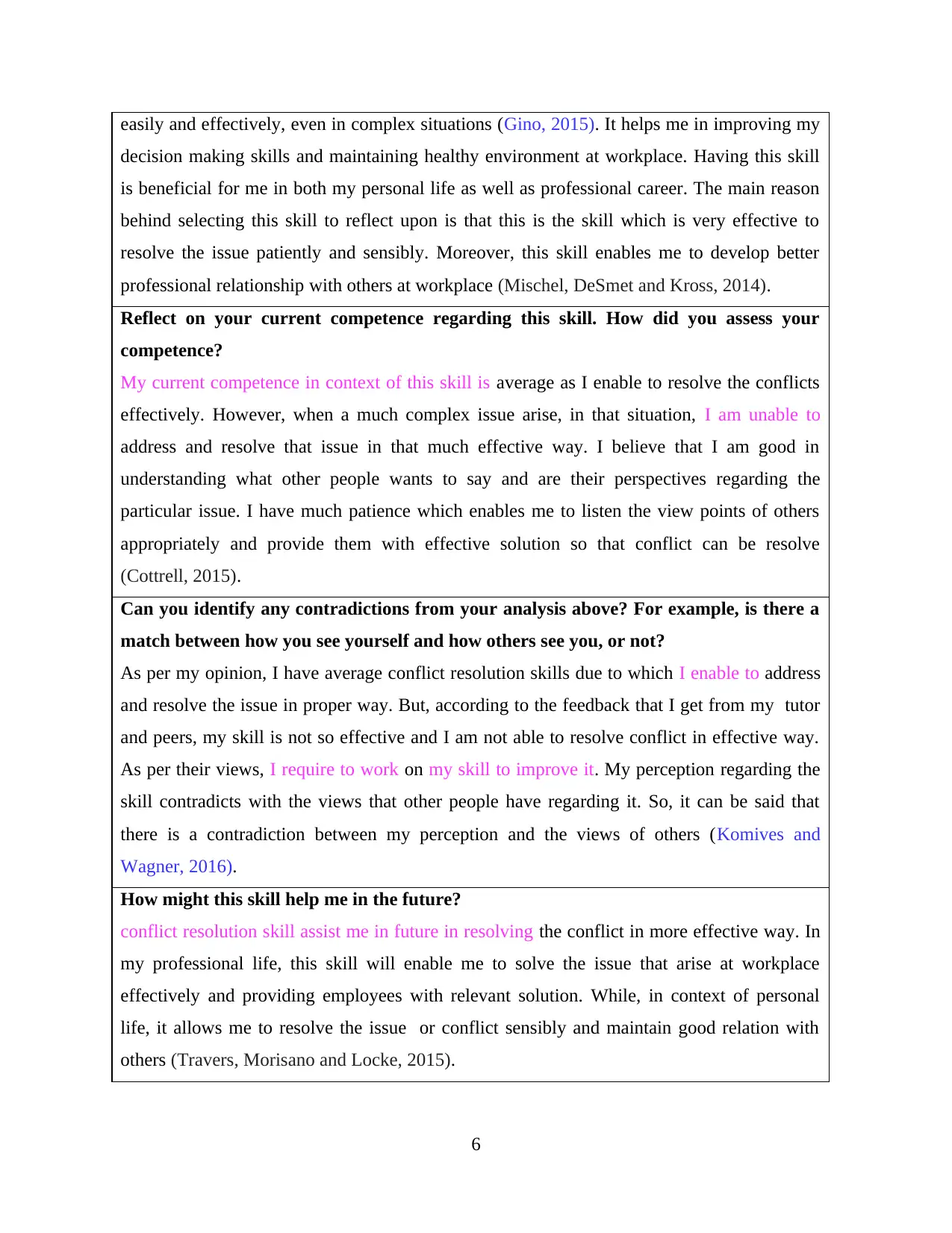
easily and effectively, even in complex situations (Gino, 2015). It helps me in improving my
decision making skills and maintaining healthy environment at workplace. Having this skill
is beneficial for me in both my personal life as well as professional career. The main reason
behind selecting this skill to reflect upon is that this is the skill which is very effective to
resolve the issue patiently and sensibly. Moreover, this skill enables me to develop better
professional relationship with others at workplace (Mischel, DeSmet and Kross, 2014).
Reflect on your current competence regarding this skill. How did you assess your
competence?
My current competence in context of this skill is average as I enable to resolve the conflicts
effectively. However, when a much complex issue arise, in that situation, I am unable to
address and resolve that issue in that much effective way. I believe that I am good in
understanding what other people wants to say and are their perspectives regarding the
particular issue. I have much patience which enables me to listen the view points of others
appropriately and provide them with effective solution so that conflict can be resolve
(Cottrell, 2015).
Can you identify any contradictions from your analysis above? For example, is there a
match between how you see yourself and how others see you, or not?
As per my opinion, I have average conflict resolution skills due to which I enable to address
and resolve the issue in proper way. But, according to the feedback that I get from my tutor
and peers, my skill is not so effective and I am not able to resolve conflict in effective way.
As per their views, I require to work on my skill to improve it. My perception regarding the
skill contradicts with the views that other people have regarding it. So, it can be said that
there is a contradiction between my perception and the views of others (Komives and
Wagner, 2016).
How might this skill help me in the future?
conflict resolution skill assist me in future in resolving the conflict in more effective way. In
my professional life, this skill will enable me to solve the issue that arise at workplace
effectively and providing employees with relevant solution. While, in context of personal
life, it allows me to resolve the issue or conflict sensibly and maintain good relation with
others (Travers, Morisano and Locke, 2015).
6
decision making skills and maintaining healthy environment at workplace. Having this skill
is beneficial for me in both my personal life as well as professional career. The main reason
behind selecting this skill to reflect upon is that this is the skill which is very effective to
resolve the issue patiently and sensibly. Moreover, this skill enables me to develop better
professional relationship with others at workplace (Mischel, DeSmet and Kross, 2014).
Reflect on your current competence regarding this skill. How did you assess your
competence?
My current competence in context of this skill is average as I enable to resolve the conflicts
effectively. However, when a much complex issue arise, in that situation, I am unable to
address and resolve that issue in that much effective way. I believe that I am good in
understanding what other people wants to say and are their perspectives regarding the
particular issue. I have much patience which enables me to listen the view points of others
appropriately and provide them with effective solution so that conflict can be resolve
(Cottrell, 2015).
Can you identify any contradictions from your analysis above? For example, is there a
match between how you see yourself and how others see you, or not?
As per my opinion, I have average conflict resolution skills due to which I enable to address
and resolve the issue in proper way. But, according to the feedback that I get from my tutor
and peers, my skill is not so effective and I am not able to resolve conflict in effective way.
As per their views, I require to work on my skill to improve it. My perception regarding the
skill contradicts with the views that other people have regarding it. So, it can be said that
there is a contradiction between my perception and the views of others (Komives and
Wagner, 2016).
How might this skill help me in the future?
conflict resolution skill assist me in future in resolving the conflict in more effective way. In
my professional life, this skill will enable me to solve the issue that arise at workplace
effectively and providing employees with relevant solution. While, in context of personal
life, it allows me to resolve the issue or conflict sensibly and maintain good relation with
others (Travers, Morisano and Locke, 2015).
6
You're viewing a preview
Unlock full access by subscribing today!
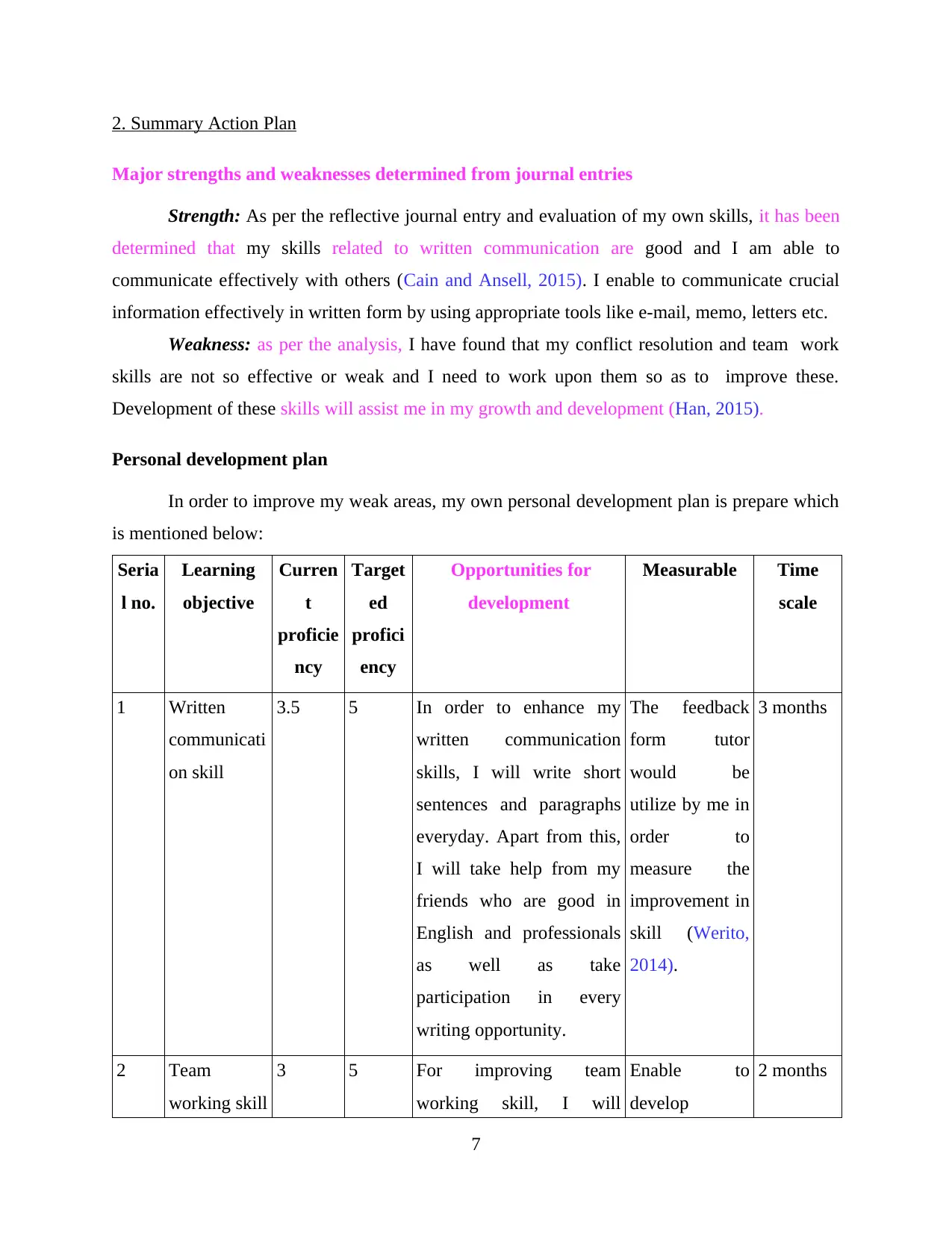
2. Summary Action Plan
Major strengths and weaknesses determined from journal entries
Strength: As per the reflective journal entry and evaluation of my own skills, it has been
determined that my skills related to written communication are good and I am able to
communicate effectively with others (Cain and Ansell, 2015). I enable to communicate crucial
information effectively in written form by using appropriate tools like e-mail, memo, letters etc.
Weakness: as per the analysis, I have found that my conflict resolution and team work
skills are not so effective or weak and I need to work upon them so as to improve these.
Development of these skills will assist me in my growth and development (Han, 2015).
Personal development plan
In order to improve my weak areas, my own personal development plan is prepare which
is mentioned below:
Seria
l no.
Learning
objective
Curren
t
proficie
ncy
Target
ed
profici
ency
Opportunities for
development
Measurable Time
scale
1 Written
communicati
on skill
3.5 5 In order to enhance my
written communication
skills, I will write short
sentences and paragraphs
everyday. Apart from this,
I will take help from my
friends who are good in
English and professionals
as well as take
participation in every
writing opportunity.
The feedback
form tutor
would be
utilize by me in
order to
measure the
improvement in
skill (Werito,
2014).
3 months
2 Team
working skill
3 5 For improving team
working skill, I will
Enable to
develop
2 months
7
Major strengths and weaknesses determined from journal entries
Strength: As per the reflective journal entry and evaluation of my own skills, it has been
determined that my skills related to written communication are good and I am able to
communicate effectively with others (Cain and Ansell, 2015). I enable to communicate crucial
information effectively in written form by using appropriate tools like e-mail, memo, letters etc.
Weakness: as per the analysis, I have found that my conflict resolution and team work
skills are not so effective or weak and I need to work upon them so as to improve these.
Development of these skills will assist me in my growth and development (Han, 2015).
Personal development plan
In order to improve my weak areas, my own personal development plan is prepare which
is mentioned below:
Seria
l no.
Learning
objective
Curren
t
proficie
ncy
Target
ed
profici
ency
Opportunities for
development
Measurable Time
scale
1 Written
communicati
on skill
3.5 5 In order to enhance my
written communication
skills, I will write short
sentences and paragraphs
everyday. Apart from this,
I will take help from my
friends who are good in
English and professionals
as well as take
participation in every
writing opportunity.
The feedback
form tutor
would be
utilize by me in
order to
measure the
improvement in
skill (Werito,
2014).
3 months
2 Team
working skill
3 5 For improving team
working skill, I will
Enable to
develop
2 months
7
Paraphrase This Document
Need a fresh take? Get an instant paraphrase of this document with our AI Paraphraser
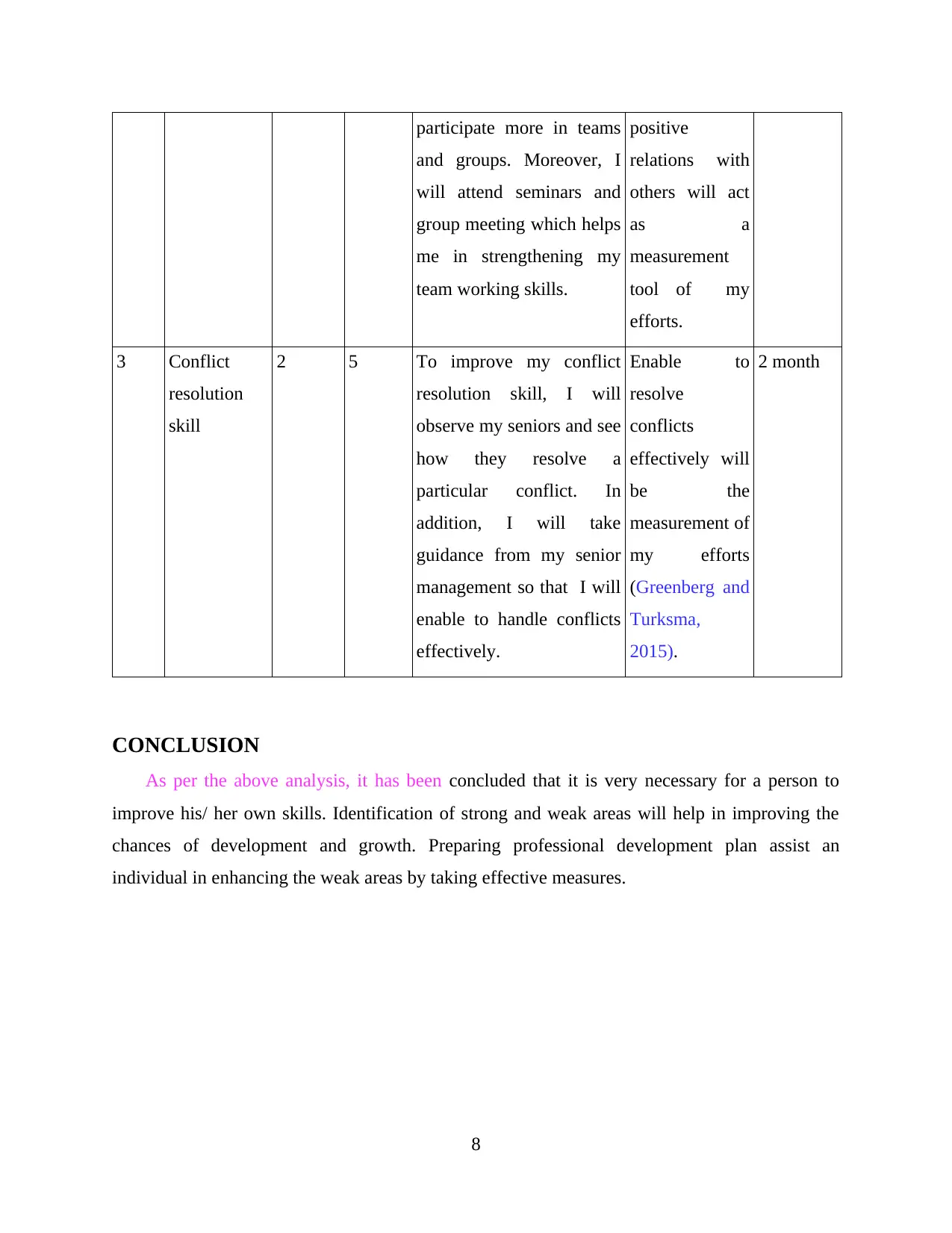
participate more in teams
and groups. Moreover, I
will attend seminars and
group meeting which helps
me in strengthening my
team working skills.
positive
relations with
others will act
as a
measurement
tool of my
efforts.
3 Conflict
resolution
skill
2 5 To improve my conflict
resolution skill, I will
observe my seniors and see
how they resolve a
particular conflict. In
addition, I will take
guidance from my senior
management so that I will
enable to handle conflicts
effectively.
Enable to
resolve
conflicts
effectively will
be the
measurement of
my efforts
(Greenberg and
Turksma,
2015).
2 month
CONCLUSION
As per the above analysis, it has been concluded that it is very necessary for a person to
improve his/ her own skills. Identification of strong and weak areas will help in improving the
chances of development and growth. Preparing professional development plan assist an
individual in enhancing the weak areas by taking effective measures.
8
and groups. Moreover, I
will attend seminars and
group meeting which helps
me in strengthening my
team working skills.
positive
relations with
others will act
as a
measurement
tool of my
efforts.
3 Conflict
resolution
skill
2 5 To improve my conflict
resolution skill, I will
observe my seniors and see
how they resolve a
particular conflict. In
addition, I will take
guidance from my senior
management so that I will
enable to handle conflicts
effectively.
Enable to
resolve
conflicts
effectively will
be the
measurement of
my efforts
(Greenberg and
Turksma,
2015).
2 month
CONCLUSION
As per the above analysis, it has been concluded that it is very necessary for a person to
improve his/ her own skills. Identification of strong and weak areas will help in improving the
chances of development and growth. Preparing professional development plan assist an
individual in enhancing the weak areas by taking effective measures.
8
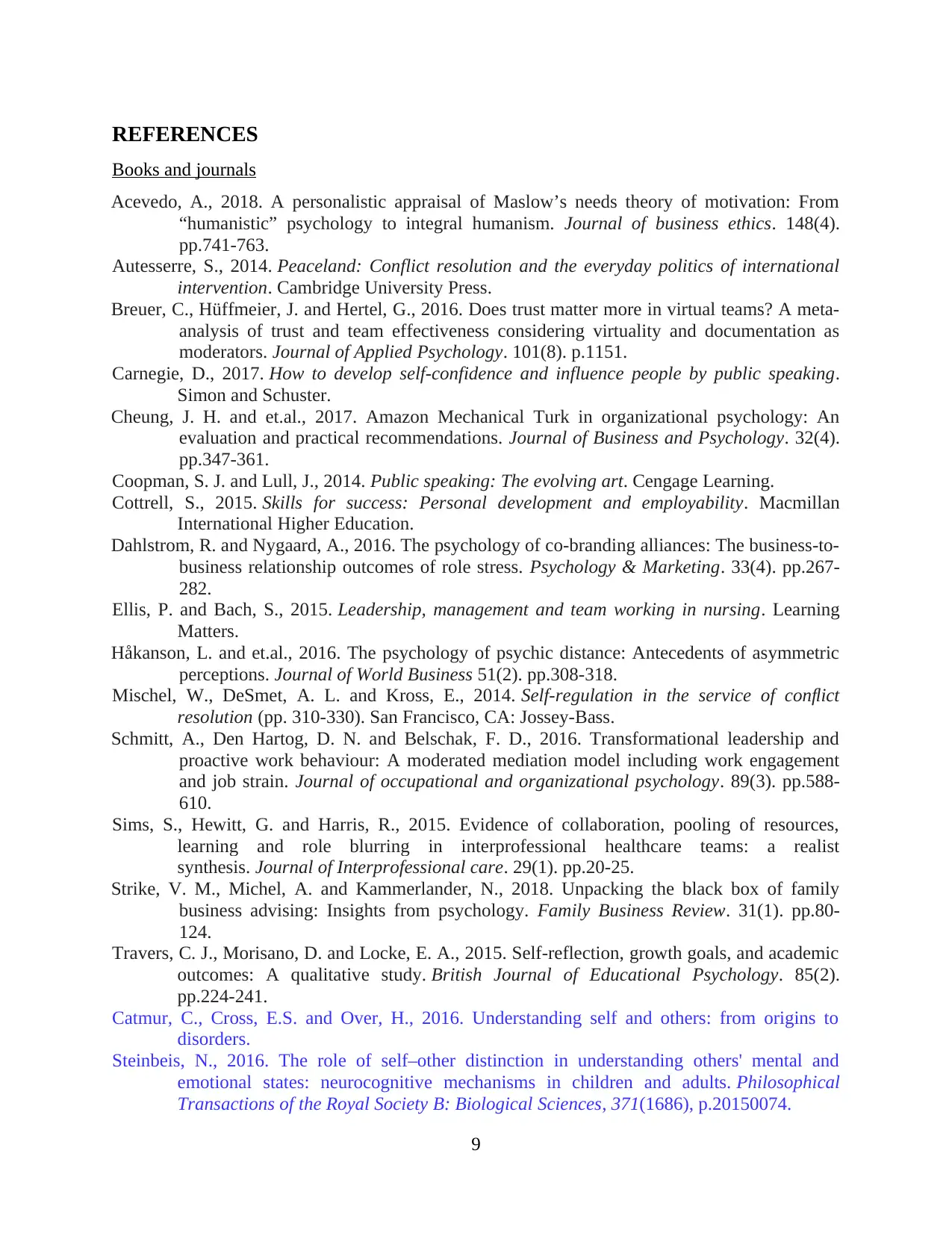
REFERENCES
Books and journals
Acevedo, A., 2018. A personalistic appraisal of Maslow’s needs theory of motivation: From
“humanistic” psychology to integral humanism. Journal of business ethics. 148(4).
pp.741-763.
Autesserre, S., 2014. Peaceland: Conflict resolution and the everyday politics of international
intervention. Cambridge University Press.
Breuer, C., Hüffmeier, J. and Hertel, G., 2016. Does trust matter more in virtual teams? A meta-
analysis of trust and team effectiveness considering virtuality and documentation as
moderators. Journal of Applied Psychology. 101(8). p.1151.
Carnegie, D., 2017. How to develop self-confidence and influence people by public speaking.
Simon and Schuster.
Cheung, J. H. and et.al., 2017. Amazon Mechanical Turk in organizational psychology: An
evaluation and practical recommendations. Journal of Business and Psychology. 32(4).
pp.347-361.
Coopman, S. J. and Lull, J., 2014. Public speaking: The evolving art. Cengage Learning.
Cottrell, S., 2015. Skills for success: Personal development and employability. Macmillan
International Higher Education.
Dahlstrom, R. and Nygaard, A., 2016. The psychology of co‐branding alliances: The business‐to‐
business relationship outcomes of role stress. Psychology & Marketing. 33(4). pp.267-
282.
Ellis, P. and Bach, S., 2015. Leadership, management and team working in nursing. Learning
Matters.
Håkanson, L. and et.al., 2016. The psychology of psychic distance: Antecedents of asymmetric
perceptions. Journal of World Business 51(2). pp.308-318.
Mischel, W., DeSmet, A. L. and Kross, E., 2014. Self-regulation in the service of conflict
resolution (pp. 310-330). San Francisco, CA: Jossey-Bass.
Schmitt, A., Den Hartog, D. N. and Belschak, F. D., 2016. Transformational leadership and
proactive work behaviour: A moderated mediation model including work engagement
and job strain. Journal of occupational and organizational psychology. 89(3). pp.588-
610.
Sims, S., Hewitt, G. and Harris, R., 2015. Evidence of collaboration, pooling of resources,
learning and role blurring in interprofessional healthcare teams: a realist
synthesis. Journal of Interprofessional care. 29(1). pp.20-25.
Strike, V. M., Michel, A. and Kammerlander, N., 2018. Unpacking the black box of family
business advising: Insights from psychology. Family Business Review. 31(1). pp.80-
124.
Travers, C. J., Morisano, D. and Locke, E. A., 2015. Self‐reflection, growth goals, and academic
outcomes: A qualitative study. British Journal of Educational Psychology. 85(2).
pp.224-241.
Catmur, C., Cross, E.S. and Over, H., 2016. Understanding self and others: from origins to
disorders.
Steinbeis, N., 2016. The role of self–other distinction in understanding others' mental and
emotional states: neurocognitive mechanisms in children and adults. Philosophical
Transactions of the Royal Society B: Biological Sciences, 371(1686), p.20150074.
9
Books and journals
Acevedo, A., 2018. A personalistic appraisal of Maslow’s needs theory of motivation: From
“humanistic” psychology to integral humanism. Journal of business ethics. 148(4).
pp.741-763.
Autesserre, S., 2014. Peaceland: Conflict resolution and the everyday politics of international
intervention. Cambridge University Press.
Breuer, C., Hüffmeier, J. and Hertel, G., 2016. Does trust matter more in virtual teams? A meta-
analysis of trust and team effectiveness considering virtuality and documentation as
moderators. Journal of Applied Psychology. 101(8). p.1151.
Carnegie, D., 2017. How to develop self-confidence and influence people by public speaking.
Simon and Schuster.
Cheung, J. H. and et.al., 2017. Amazon Mechanical Turk in organizational psychology: An
evaluation and practical recommendations. Journal of Business and Psychology. 32(4).
pp.347-361.
Coopman, S. J. and Lull, J., 2014. Public speaking: The evolving art. Cengage Learning.
Cottrell, S., 2015. Skills for success: Personal development and employability. Macmillan
International Higher Education.
Dahlstrom, R. and Nygaard, A., 2016. The psychology of co‐branding alliances: The business‐to‐
business relationship outcomes of role stress. Psychology & Marketing. 33(4). pp.267-
282.
Ellis, P. and Bach, S., 2015. Leadership, management and team working in nursing. Learning
Matters.
Håkanson, L. and et.al., 2016. The psychology of psychic distance: Antecedents of asymmetric
perceptions. Journal of World Business 51(2). pp.308-318.
Mischel, W., DeSmet, A. L. and Kross, E., 2014. Self-regulation in the service of conflict
resolution (pp. 310-330). San Francisco, CA: Jossey-Bass.
Schmitt, A., Den Hartog, D. N. and Belschak, F. D., 2016. Transformational leadership and
proactive work behaviour: A moderated mediation model including work engagement
and job strain. Journal of occupational and organizational psychology. 89(3). pp.588-
610.
Sims, S., Hewitt, G. and Harris, R., 2015. Evidence of collaboration, pooling of resources,
learning and role blurring in interprofessional healthcare teams: a realist
synthesis. Journal of Interprofessional care. 29(1). pp.20-25.
Strike, V. M., Michel, A. and Kammerlander, N., 2018. Unpacking the black box of family
business advising: Insights from psychology. Family Business Review. 31(1). pp.80-
124.
Travers, C. J., Morisano, D. and Locke, E. A., 2015. Self‐reflection, growth goals, and academic
outcomes: A qualitative study. British Journal of Educational Psychology. 85(2).
pp.224-241.
Catmur, C., Cross, E.S. and Over, H., 2016. Understanding self and others: from origins to
disorders.
Steinbeis, N., 2016. The role of self–other distinction in understanding others' mental and
emotional states: neurocognitive mechanisms in children and adults. Philosophical
Transactions of the Royal Society B: Biological Sciences, 371(1686), p.20150074.
9
You're viewing a preview
Unlock full access by subscribing today!
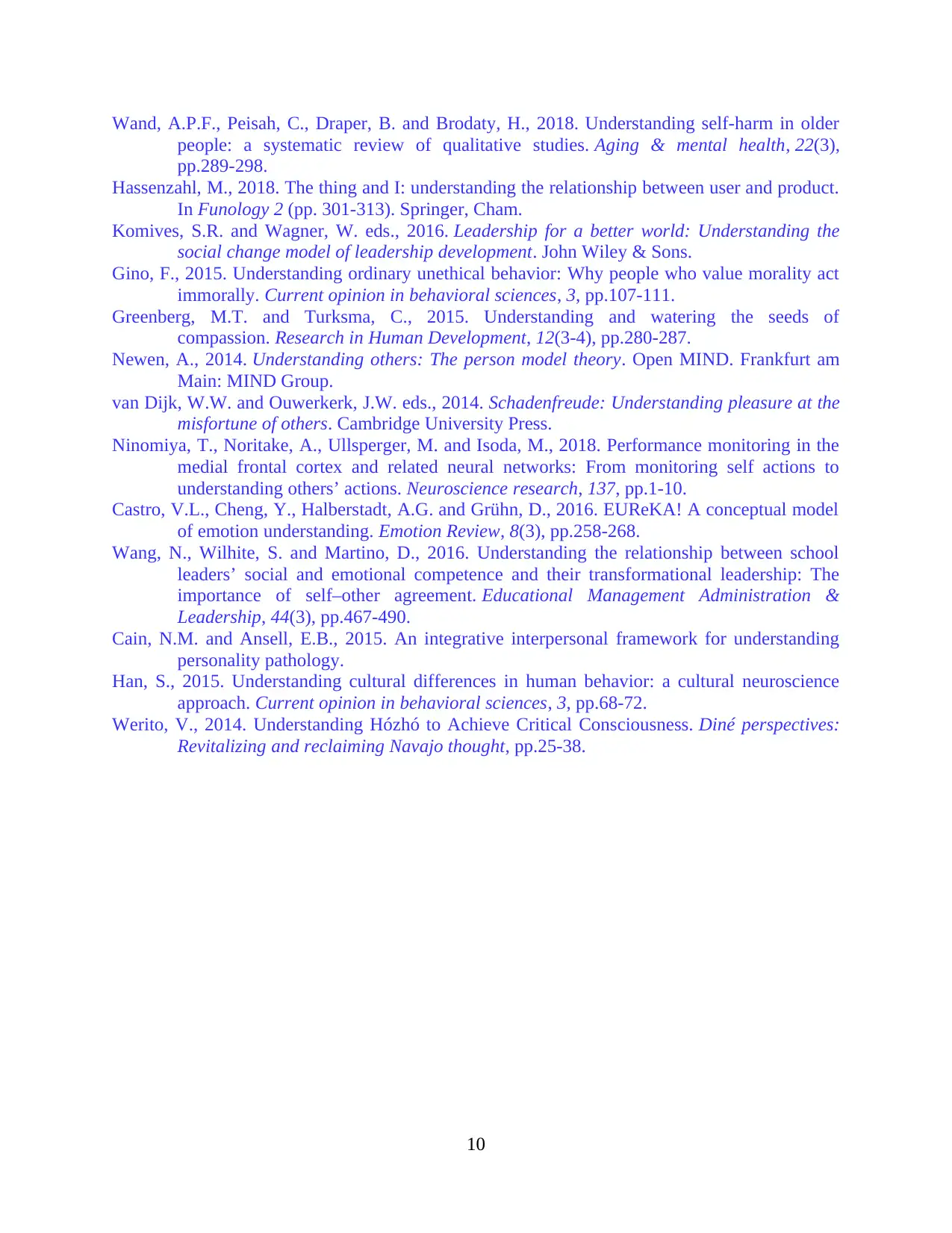
Wand, A.P.F., Peisah, C., Draper, B. and Brodaty, H., 2018. Understanding self-harm in older
people: a systematic review of qualitative studies. Aging & mental health, 22(3),
pp.289-298.
Hassenzahl, M., 2018. The thing and I: understanding the relationship between user and product.
In Funology 2 (pp. 301-313). Springer, Cham.
Komives, S.R. and Wagner, W. eds., 2016. Leadership for a better world: Understanding the
social change model of leadership development. John Wiley & Sons.
Gino, F., 2015. Understanding ordinary unethical behavior: Why people who value morality act
immorally. Current opinion in behavioral sciences, 3, pp.107-111.
Greenberg, M.T. and Turksma, C., 2015. Understanding and watering the seeds of
compassion. Research in Human Development, 12(3-4), pp.280-287.
Newen, A., 2014. Understanding others: The person model theory. Open MIND. Frankfurt am
Main: MIND Group.
van Dijk, W.W. and Ouwerkerk, J.W. eds., 2014. Schadenfreude: Understanding pleasure at the
misfortune of others. Cambridge University Press.
Ninomiya, T., Noritake, A., Ullsperger, M. and Isoda, M., 2018. Performance monitoring in the
medial frontal cortex and related neural networks: From monitoring self actions to
understanding others’ actions. Neuroscience research, 137, pp.1-10.
Castro, V.L., Cheng, Y., Halberstadt, A.G. and Grühn, D., 2016. EUReKA! A conceptual model
of emotion understanding. Emotion Review, 8(3), pp.258-268.
Wang, N., Wilhite, S. and Martino, D., 2016. Understanding the relationship between school
leaders’ social and emotional competence and their transformational leadership: The
importance of self–other agreement. Educational Management Administration &
Leadership, 44(3), pp.467-490.
Cain, N.M. and Ansell, E.B., 2015. An integrative interpersonal framework for understanding
personality pathology.
Han, S., 2015. Understanding cultural differences in human behavior: a cultural neuroscience
approach. Current opinion in behavioral sciences, 3, pp.68-72.
Werito, V., 2014. Understanding Hózhó to Achieve Critical Consciousness. Diné perspectives:
Revitalizing and reclaiming Navajo thought, pp.25-38.
10
people: a systematic review of qualitative studies. Aging & mental health, 22(3),
pp.289-298.
Hassenzahl, M., 2018. The thing and I: understanding the relationship between user and product.
In Funology 2 (pp. 301-313). Springer, Cham.
Komives, S.R. and Wagner, W. eds., 2016. Leadership for a better world: Understanding the
social change model of leadership development. John Wiley & Sons.
Gino, F., 2015. Understanding ordinary unethical behavior: Why people who value morality act
immorally. Current opinion in behavioral sciences, 3, pp.107-111.
Greenberg, M.T. and Turksma, C., 2015. Understanding and watering the seeds of
compassion. Research in Human Development, 12(3-4), pp.280-287.
Newen, A., 2014. Understanding others: The person model theory. Open MIND. Frankfurt am
Main: MIND Group.
van Dijk, W.W. and Ouwerkerk, J.W. eds., 2014. Schadenfreude: Understanding pleasure at the
misfortune of others. Cambridge University Press.
Ninomiya, T., Noritake, A., Ullsperger, M. and Isoda, M., 2018. Performance monitoring in the
medial frontal cortex and related neural networks: From monitoring self actions to
understanding others’ actions. Neuroscience research, 137, pp.1-10.
Castro, V.L., Cheng, Y., Halberstadt, A.G. and Grühn, D., 2016. EUReKA! A conceptual model
of emotion understanding. Emotion Review, 8(3), pp.258-268.
Wang, N., Wilhite, S. and Martino, D., 2016. Understanding the relationship between school
leaders’ social and emotional competence and their transformational leadership: The
importance of self–other agreement. Educational Management Administration &
Leadership, 44(3), pp.467-490.
Cain, N.M. and Ansell, E.B., 2015. An integrative interpersonal framework for understanding
personality pathology.
Han, S., 2015. Understanding cultural differences in human behavior: a cultural neuroscience
approach. Current opinion in behavioral sciences, 3, pp.68-72.
Werito, V., 2014. Understanding Hózhó to Achieve Critical Consciousness. Diné perspectives:
Revitalizing and reclaiming Navajo thought, pp.25-38.
10
1 out of 13
Related Documents
Your All-in-One AI-Powered Toolkit for Academic Success.
+13062052269
info@desklib.com
Available 24*7 on WhatsApp / Email
![[object Object]](/_next/static/media/star-bottom.7253800d.svg)
Unlock your academic potential
© 2024 | Zucol Services PVT LTD | All rights reserved.





